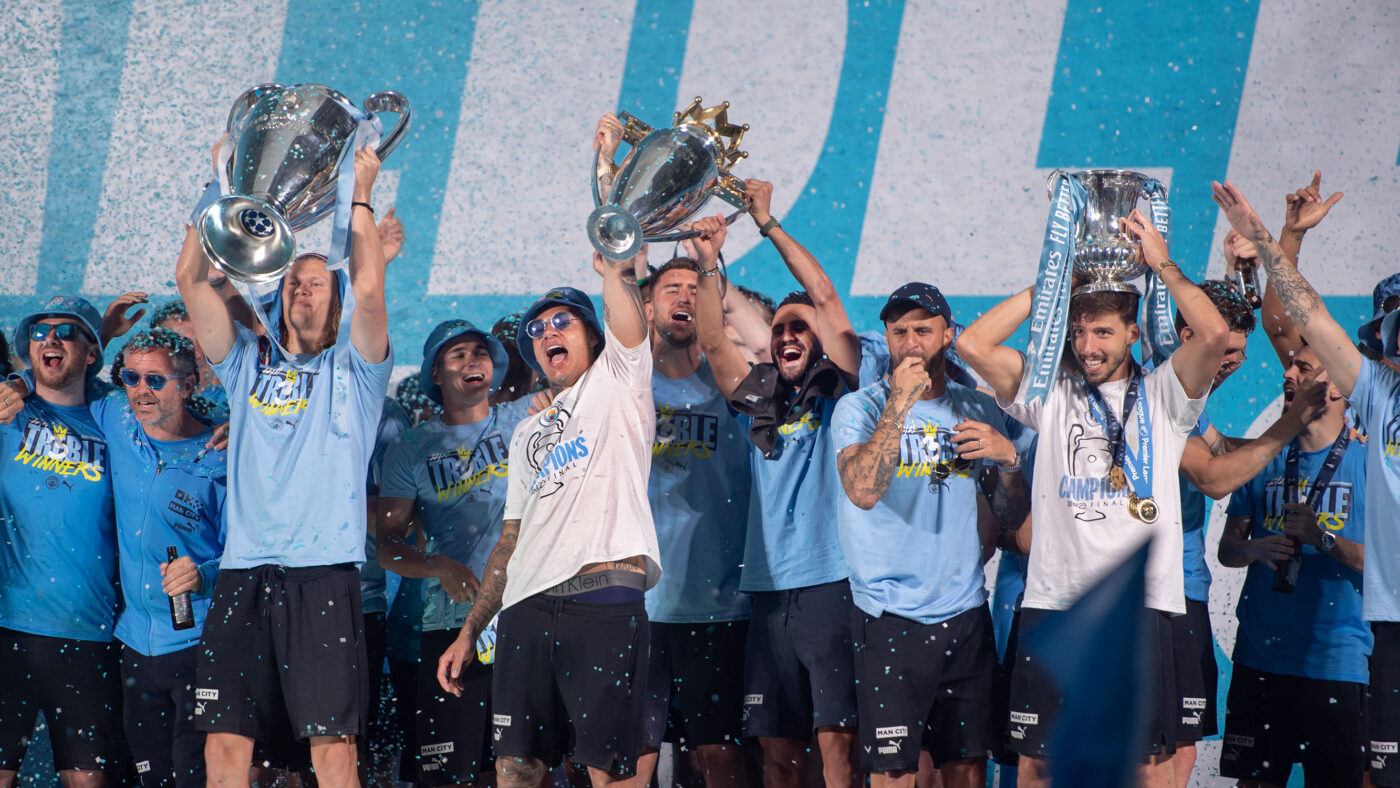I boycotted the Qatar World Cup. It was a small and meaningless gesture, but nonetheless one I wanted to make. I was surprised, though, when at a friend’s party I mentioned this to a stranger. He was furious, and raged at me about my ‘little moral stand’, done only to make myself look good – and this crystallised something I’ve sensed for some time: Sportswashing, the ownership of sporting assets to improve the image of dubious actors, is a breeding ground for cynicism and apathy in our public life.
In football, sportswashing began in earnest when Roman Abramovich bought Chelsea two decades ago, but has intensified in recent years with the Abu Dhabi royal family’s acquisition of Manchester City and the purchase of 80% of Newcastle United by Saudi Arabia’s Public Investment Fund. The Premier League has become an intrastate competition, with the City-Newcastle game now witheringly referred to as ‘El Gasico’.
In Manchester City’s case the scale of the investment has also made the league thoroughly boring, with Pep Guardiola’s team winning five of the last six titles. They went one further a couple of weeks ago by winning their first Champions League – the club’s first European trophy since 1970, long before it became the plaything of an autocratic Gulf state.
Things could yet turn sour for City, however. The club is facing over 100 allegations of financial irregularities (all strenuously denied, of course). Whatever punishment the FA may choose to mete out, I can’t help feel it distracts from a far more basic ethical issue over letting our clubs be taken over by dictatorial foreign states.
What’s also striking is the impact that ownership has had on the fanbases of the clubs in question. The blunt truth is that for many millions of Brits, football matters much more than politics or foreign affairs. Indeed, before the World Cup was awarded to Qatar, very few of us had any idea of the country’s approach to gay rights or its treatment of migrant workers. Likewise, Newcastle fans may not have been up to speed on the death of Jamal Kashoggi or Saudi Arabia’s horribly repressive religious laws.
Equally true, however, is that the many who do know about these things simply don’t care. We are now in a situation where tens thousands of English football fans are happy to defend oligarchy, while others quietly pine for an oil state of their own so their team can be vaguely competitive.
So we end up with a discourse where the most incomparable things are weighed against each other; on the one hand, the Saudi Arabian government executes children; on the other, Newcastle have had a good season! The anger of the person I met at the party was surely, at least partly down to the effort required to enjoy football in face of this cognitive dissonance.
It doesn’t help that football’s vast commentariat is either too cowed or too incapable to even superficially address the issues. BT Sport’s recent fawning coverage of Man City’s recent triumph – at one stage the words ‘the greatest story in club history’ were genuinely spoken – asked us to suspend any qualms and celebrate the plucky underdog story of a humble petrostate with a dream. The British channel’s presentation maintained a complete omertà around the provenance of Man City’s success and any ethical concerns arising from it.
Raising such concerns is often dismissed as ‘bringing politics into football’. To be clear, it is the states who buy these clubs who are politicising the game, not those who object. It is though a political decision to respond to that situation with silence and coverage as if it is just football as usual.
This in turn breeds a real fatalism: a sense that, in the end, nothing can be done about our clubs being used in this way. In fact, this significantly underestimates the importance of local fans to the sportswashing enterprise.
In February 2016, Liverpool fans staged a walk-out over high ticket prices; their American owners FSG, distressed by the visual of an emptying stadium, climbed down within days. A few weeks of empty Newcastle and Man City stadiums would at least see their owners forced to address the issues. It would also damage to the very reputation the sportswashing is designed to burnish. As it stands, however, the combination of success on the pitch, the cowardice of most of the football media and fans’ loyalty to their clubs means many play along with their cherished local asset being used as a tool of state propaganda. Those who do object likely feel powerless in the face of the near-total indifference of both the football establishment and their fellow fans.
Football doesn’t have to be like this. Of course, money has always counted; in the mid-1990s, Jack Walker effectively bought Blackburn Rovers the English league title. Yet there is a clear difference between a local businessman buying a club to which they have deep connections and a state acquiring one for their own purposes. Those purposes do not necessarily align those of fans, who through their justifications become participants in the sportswashing project itself.
The era of unlimited state wealth funding football isn’t even that fun. I would bet that almost everyone would have more fun at Isthmian League Dulwich Hamlet for £12 than watching Manchester City thump a Premier League makeweight for the umpteenth time on their way to yet another league title. My worry now is that we are on an upwards ratchet: as more and more people acquiesce to political ownership of the clubs they love, the more they will grow cynical and pessimistic about their potential to effect any change at all.
Click here to subscribe to our daily briefing – the best pieces from CapX and across the web.
CapX depends on the generosity of its readers. If you value what we do, please consider making a donation.


